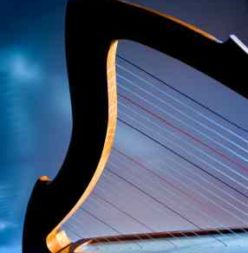When you are learning an unfamiliar piece, don’t overlook the value of practicing by listening. Hearing a piece is a vital part of learning it, and can speed up the process tremendously. Just as visualizing is an overlooked practice strategy, listening barely registers on the list for most students and even some harp teachers. My grandmother, an old-school piano teacher, used to warn me that listening to recordings of a piece I was learning would interfere with my own interpretation of a piece. Little did she understand how valuable that listening could have been, saving me countless practice repetitions of pieces full of wrong rhythms, inappropriate tempi and even wrong notes.
While the fear of copying someone else’s interpretation dies hard in some circles, your harp teacher will probably be open to playing a piece for you, as well as helping you find at least one recording of it. Luckily, my harp teacher believed in the power of listening and even suggested I make a compilation of all the pieces in my recital to listen to religiously. Active listening, with the score in front of you, will make you much better at listening while you play, helping you avoid that dreaded automatic-pilot state where we don’t hear our own music.
But even listening to recordings while doing other things (my favorite is while driving) will drastically speed up training your ear and making the piece “yours” from the inside. Likewise, it will ultimately help you interpret the piece with knowledge and sensitivity. Instead of restricting you, listening provides fresh inspiration that actually deepens the possibilities of your interpretation of your piece.
Finally, don’t forget that attending live performances, no matter what pieces are played, is unbeatable training in music. Even if the concerts available in your area don’t include harp, drink in all the live music you can find. If you love Celtic music, pay attention to what singers and instrumentalists of all kinds do to translate its magic, and think about what you would do in their place. All of this listening will enrich your playing beyond your imagination.
This post is adapted from material that I originally published in the ezine, Notes from the Harp.
